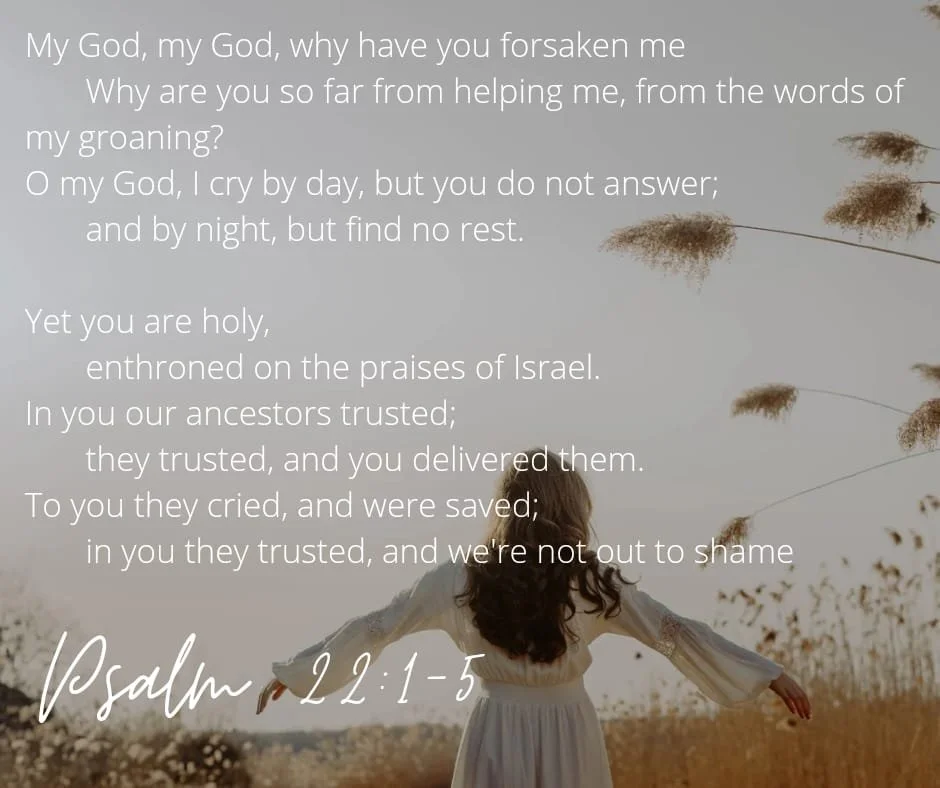Good Friday
The thing that fascinates me about the book of Psalms is its honest impression of human experiences and emotion. While many would rather focus on the good stuff—always looking at the positive and what is lovely—the book of Psalms shows the reality that life is not always pretty.
By reading the Psalms (I mean the whole book and not just the favorite chapter 23), we will know that the writer of these songs and prayers are not living in a life of fantasy. Unlike many who look at Christian life as being “happy-clappy”, the ancient poets are people who are immersed in their meditation of life’s hardest questions and they expressed it in beautiful songs and poetry.
One interesting kind of Psalm is the Lament—it is a form of poetry that expresses the undesirable side of human life. It often speaks about sickness, sadness, pain, agony, confusion, uncertainty, or even death. In other words, laments are cries of people in depressing situations.
Psalm 22 is an example of a Lament. It begins with a hard accusation, “My God, my God, why have you forsaken me?” The writer was literally claiming that God has left and is nowhere to be found. This was followed by a paradoxical affirmation of God’s perfect attributes being “holy”, “enthroned”, “deliverer”, and “savior” (vv. 3–5).
Here, it seems that the writer is looking at the great irony of his life. He believes in a holy God, who lives eternally, and has the power to save, but at the moment of great tribulation, this God is nowhere to be found. Hence, the question, “Why?” But instead of answering it with, “because”, he answered it with, “trust the Lord” (v. 8). Apparently, when we are overwhelmed by life’s troubles and enemies all around and we feel weak and powerless, there is nothing else we can do but to have faith on the God who hears us and sees our struggles and pain.
The Psalmist later on finds comfort in his deliverance. He was saved from death and he believes that it was the Lord who answered him (v. 21). Therefore, he calls the community to worship because the Lord has not totally forgotten him and he was delivered from his affliction (vv. 22–24). In other words, the Psalmist was able to prove that his trust in the Lord was never in vain. He was not in the wrong for putting his trust in the God who is holy and just in spite the fact that he questioned God’s existence in his time of suffering.
Psalm 22 teaches us that faith and true worship comes from our experiences of grief and pain, even in the midst of doubt. Laments tell us that it’s okay not to be okay, because it is in these moments of vulnerability that we can be honest and true because it is in these times that we recognize how weak and powerless we truly are. Hence, our need for someone who is beyond us and has the power to save.
It’s interesting that the Bible did not silence the questions we like to ask God especially when we are going through a very challenging situation. The Scriptures are telling us that it is not wrong to be honest with God when it comes to expressing how we feel and what we are going through. He is the God who listens and is always concerned.
Another thing we learn from this Psalm is that there are really times when our questions cannot be answered but it doesn’t mean that we should stop exploring and look for answers. The Psalm encourages the people of God to speak out and worship with the community. This picture tells us that we don’t suffer alone. Suffering and problems are great opportunities for people of God to bond together and be there for each other. Sometimes when we are in trouble, we realize that finding answers to our questions becomes less important that having people to be there for us.
This season of lent let us learn that while life can be full of miseries and suffering we can always look back at the goodness of God that we have experienced. Let this be the source of our hope and our reason to remain faithful to the Lord who is always ready to hear our laments and prayers for help, for in the end we will be able to say as the Psalmist said,
“Praise him, you servants of the Lord!
Honor him, you descendants of Jacob!
Worship him, you people of Israel!
He does not neglect the poor or ignore their suffering;
he does not turn away from them,
but answers when they call for help.”
Psalm 22:23–24, GNT
